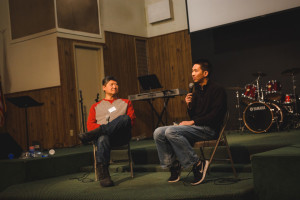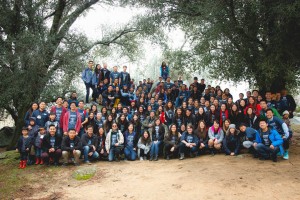by Josh Liu
How would you evaluate your understanding of church? How would you evaluate your heart attitude toward the church? How would you evaluate your participation, involvement, and commitment to the church? We would do well to elevate our view of the church to the beauty, priority, and responsibilities Scripture instructs. For that, I am deeply thankful that our College Life Retreat addressed the theme of the local church.

Overview
The 2017 College Life Retreat theme–One Body: Running Together for the Faith–focused on the beauty, commitment, need, and responsibilities of the local church. Pastor Chris Gee presented a thoroughly robust ecclesiology! Here is a brief overview of the sessions:
Session 1 – What Is the Church? (Selected Scriptures)
The church is the temple of God, a pillar of the truth, the bride of Christ, and the family of God. If the church does not feel like family, serve!
Session 2 – For Better or For Worse (Selected Scriptures)
The case for church membership and why being committed to a church will result in the deepest and most authentic love. The early church models church membership, our leaders’ responsibility to us implies it, church discipline necessitates it, the one another commands demand it, and the metaphors for the church illustrate it. The greater the commitment to one another, the deeper the love we will experience.
Session 3 – One Another (John 13:34-35; Heb. 10:24-25; James 2:1-13)
We love sacrificially like Christ loved; we fellowship in a way that provokes each other to holiness; and we love and serve in the church without partiality. We do not show favoritism and we do not exclude people.
Session 4 – The Power of Encouragement (Eph. 4:29)
Our tongues play a big role in promoting unity in the church. Biblical encouragement can draw us together. Good encouragement is God-centered, specific, genuine, thoughtful, and verbal.
Session 5 – Give Your Life Away (Acts 20:17-38)
The greatest joy is found in giving your life away to God and to others. Apostle Paul models for us what it is to knit your heart to a group of people so closely that you sweat, weep, and bleed for them.
Beside the sessions, other retreat highlights include discussion groups, lost nametag punishments, playing outdoor games in the rain, hosting a “lipdub” music video competition, and corporate sharing!
Below are brief reflections from the sessions that serve as a primer to meditating on, studying, and applying ecclesiology.

Five Brief Reflections
Reflection #1: The Church Is Important (cf. Acts 20:28)
This might seem elementary, but many do not understand the depth of the importance of the church. Practically, there are many in the church who treat the church as a low priority (e.g., committing to extracurricular activities over the church).
Pastor Chris powerfully reminded us of the importance of the church: “Why is the church worth your life? Why is the church valuable enough to give your life? Because Jesus thought it was valuable, so valuable that He gave His own life. Christ thought the church was precious enough to die for; we ought to think the church is precious enough to live for.”
Reflection #2: The Church Is Needed (cf. 1 Cor. 12:14-27; Heb. 10:25)
The pictures and metaphors (the temple of God, a pillar of the truth, the bride of Christ, the family of God, the body of Christ), responsibilities of, and commands to the church make it needed for each believer to be committed to a local assembly. It is within the church that the believer beholds the fullness of Christ, faithfully carries out the good works that God prepared, and stands as a corporate witness to the world.
Pastor Chris shared an account about Charles Spurgeon (which I have adapted from other sources but have not been able to verify as fact, yet believed it was a helpful illustration):
One day a young man came to visit Spurgeon and the young man said to him, “I can be a Christian without the church; I don’t need others.” They were sitting in the lounge by an open fire and Spurgeon picked up some tongs, took a coal from the blazing fire, and placed it on the hearth. They continued talking and after awhile, Spurgeon said, “Look down at the hearth. What happened to the coal I took out of the fire?” The young man answered, “Well, it’s become black. It’s lost its heat and its flame.” Spurgeon replied, “Young man, that’s why you need to be part of the church, because it is only together we are stimulated and together that we grow. But like this coal taken out of the fire, on its own it dies out. But in the heat of the fire all the other coals are stimulating it to go on glowing and give off heat.”
Reflection #3: The Church Is Active (cf. Rom. 12:4-8)
There are many who simply attend church without any participation or involvement in the body of Christ. The church is not simply a program or service to witness, after which an attendee returns to his or her life. Each individual member of the body of Christ is expected to be active for the healthy functioning of the whole body.
Pastor Chris highlights three myths about serving in the church: (1) my church does not need me to serve; (2) ministry is programs; and (3) I am too young to make an impact.
Scripture describes every believer as a unique part of the body with spiritual gifts given for the edification of the church, since ministry (i.e., church) is people, not program. There are no age prerequisites for the active functioning within the church.
Reflection #4: The Church Is Beautiful (cf. 2 Cor. 3:18)
I cannot help but be in awe of the biblical descriptors of the church! Too many find the church as an unattractive religious institution, outdated or offensive.
God sanctifies His saints from one degree of glory to another, unto Christlikeness. It is a beautiful image of the Gospel of Christ. The church is the temple of God (1 Pet. 2:4-5), the pillar of the truth (1 Tim. 3:15), the bride of Christ (Eph. 5:25; 31-32), and the family of God (1 Tim. 3:15; 5:1-2). It reflects the glory of God and His redemptive work!
Reflection #5: The Church Is Family (cf. Rom. 8:16-17; 1 John 3:1-2)
Many complain about a lack of intimacy, fellowship, or community in the church. There may be valid points for particularly difficult experiences; however, each believer is united in Christ becoming a child of God, brother and co-heir with Christ, and joined to the family of God.
The family of God produces authentic intimate community, overflowing in acts of love, unified in experience and devotion, and pursuing the same direction of life (cf. Acts 2:41-47; Rom. 12:9-21; Matt. 28:18-20).

Conclusion
Implied above is that there are many who have a distorted, unbiblical understanding of the church. They often consider the church unimportant, irrelevant, unnecessary, passive, unattractive, and, at best, weekend acquaintances. These reflections serve as primers–preliminary thoughts and exhortations–to studying and being a faithful member of the church to the glory of Christ–the head of the church.